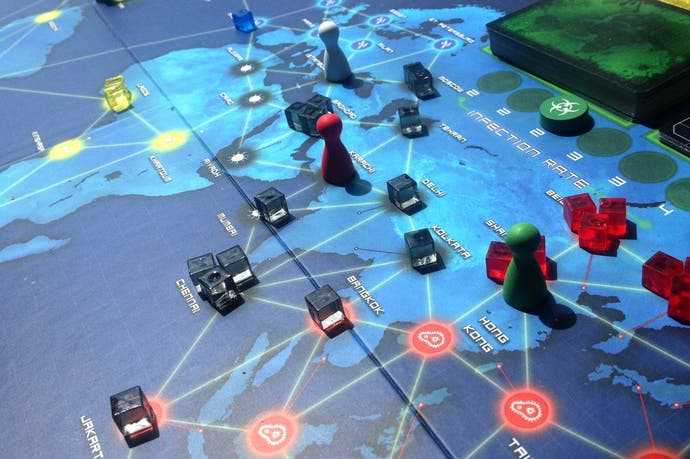Pandemic review
Sick.
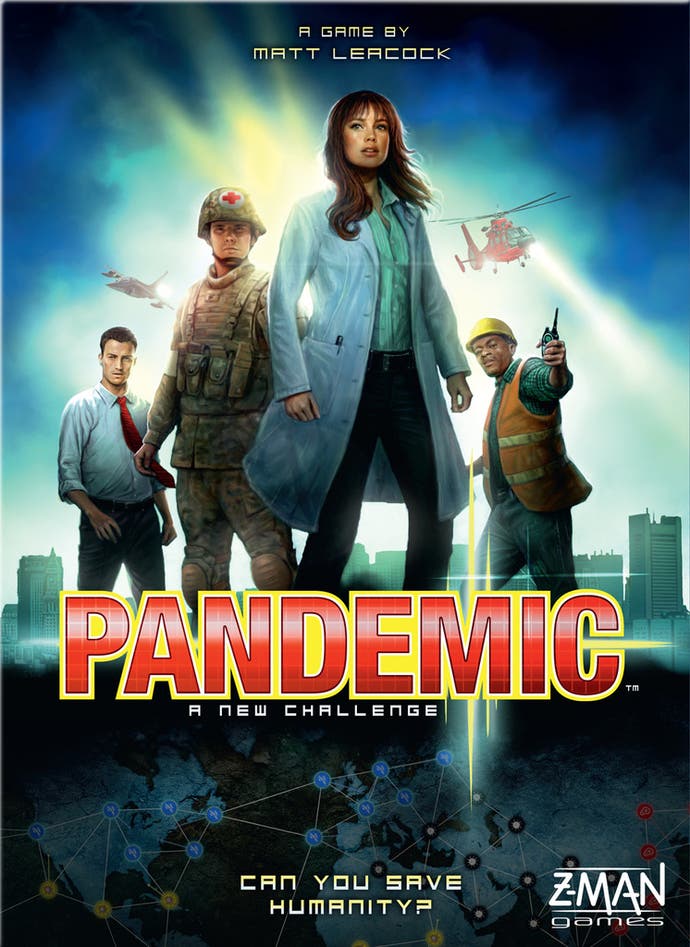
Price: £25 / Players: 2-4 / Time: 60 minutes
By now, I've heard every single excuse. "I'd love to get into board games, but they're too..."
Expensive? But you're terrified of long manuals? Maybe you've got those friends who are so competitive you just can't play board games. Maybe you don't think you could get your friends interested. Or maybe you simply don't know where to start.
Come on! You guys are gamers! You lead armies, conquer worlds and routinely face down whatever inside-out horrors emerge from the desks of sleep-deprived art directors. You must understand what a colossal milquetoast you sound like when you, a gamer, tell me you'd love to play board games, but find them too intimidating.
Now, say hello to Pandemic. It's cheap, at just £25. The manual's flimsy few pages are crystal clear. It's a co-op game, so no-one's going to get too competitive, and it has you working at the Centre for Disease Control, flying around the world trying to cure four doomsday plagues before they skim humankind from the surface of the earth, so it's not even nerdy. It's captivating, pacey and dramatic.
If the lot of you could stop fussing for one second, the Earth needs your help, and you're going to have a great time saving it. This is the perfect game to start your board game collection.
Anyone who's played Plague Inc. on iOS will know the perverse thrill of watching diseases creep across the planet, pinching out cities you've never heard of. In Pandemic, this is handled by tiny, delicious-looking cubes and an Infection deck.

On their turn, in addition to trying to save the world, players will draw at least two of these cards, each naming a city. You'll place a coloured disease cube in these cities, unless there are already three cubes there, at which point the levees break and you place a cube in every connected city, which, of course, might cause another outbreak and suddenly you and your friends are in hot, bacteria-infested water.
In other words, like most co-op board games, Pandemic keeps the pressure up by making sure every step anyone takes, the problem lurches forward, too. Did I mention there were not one, but four diseases you'll have to beat to win? Each in a different continent?
The relatively opaque puzzle that drives Pandemic (and keeps players talking) is the question, every turn, of whether it's more important to work towards prevention or the cure. The excellent answer you'll reach is that, to survive, you're going to have to do both at once, all the time, which means a lot of teamwork and a lot of plotting.
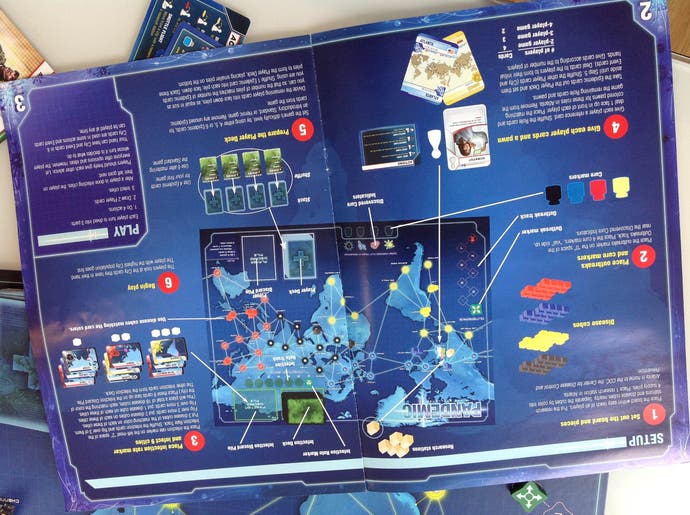
This plotting is something everyone can get involved in, because Pandemic really is very simple. On each of your turns you can take four actions, and an action can be as simple as moving between two connected cities or scrubbing one disease cube from the board.
Where things get tricky is that everyone holds a hand of Player cards, each with a city and a colour of disease on. You'll be drawing two of these every turn. By discarding one you can "Take a direct flight" and zip straight to that city on the card as an action. But if you find yourself in the city presented on the card, its power is immense. You can "Charter a flight", going anywhere on the board. You can throw up a new Research Centre that players can travel between, for free, expanding your friends' private transport network. Or you can give that card to another player stood in the same city.
Why would you be in the same city? Shouldn't every player be sweating over a different, far-flung corner of the globe, immunising elephants in India or cordoning off cabbies in New York? Ah, see, the way you finally cure diseases is by collecting five cards of the same colour, then cashing them in at a Research Station, at which point a Cure action in a city removes not one cube, but all of them. This also opens up the dangerously seductive option of all the players dropping everything to wipe that disease out entirely, making the game exactly 25% easier. More importantly, when you've discovered the cure for all four diseases, you win.
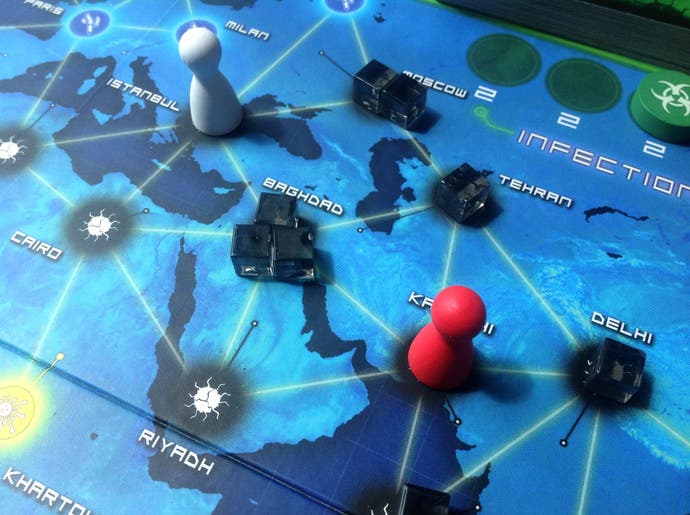
All of which means making a move in Pandemic first involves hacking your way through any number of problems and possibilities. Paris needs attention now, but you're holding the Paris card as part of the blue disease set you're collecting, so a flight's out of the question. You could waste most of your turn catching a ferry to Madrid then driving to Paris, but you could do so much more work by staying here, in Buenos Aires.
"What are the odds that Paris will get infected again, anyway?" you ask the table. Everyone falls silent and looks at the Infection deck, not daring to breathe.
Regarding the odds of places getting infected again, we come to the single rule in Pandemic that, without fail, produces little grins and whistles from the board gamers that learn of it. It's just so clever. Let's talk about the Intensify Phase, which even sounds awesome.
Hidden in Pandemic's player deck are a number of "Epidemic" cards. Rather than getting your bonus at the end of the turn, the lot of you might be blindsided by three cubes placed in a single city. Which is bad. But what's really bad is that this triggers the Intensify Phase, where you pick up the cards you've drawn so far out of the Infection deck, shuffle them, and place them back on top of the Infection deck.
This means disease cubes in Pandemic don't simply get sprinkled across the board like plastic hailstones. If your game starts with a ripple of Red infections in Tokyo, Bangkok and Shanghai, those cities are going to get hammered again and again for the entire game. This gives every game of Pandemic a different flavour, but it also brings in an element of card counting. Was Paris in the discard pile before that last Epidemic? How sure are you guys? Because, suddenly, the entire game is hanging on whether or not you can let Paris be.
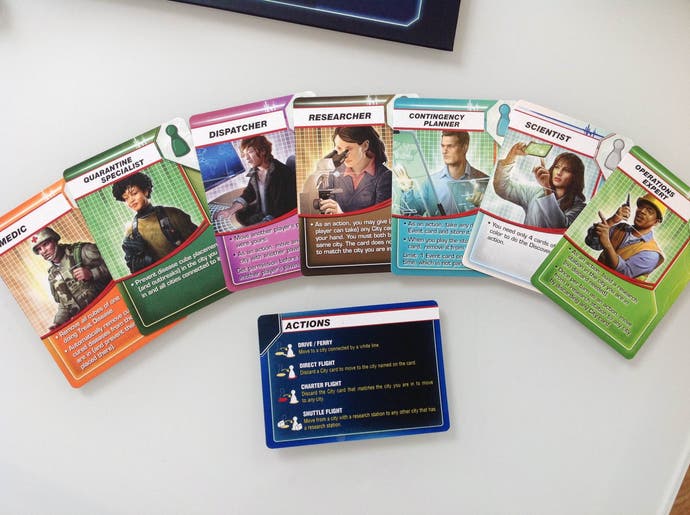
Pandemic is just a really good puzzle. It's not a particularly deep one, so very sensible tactics (if not solutions) rise to the surface of its petri dish after just a few plays, but what Pandemic lacks in obscurity it makes up for in accessibility. Absolutely anybody can play this game, because this apocalypse of gelatinous cubes you're all staring at is so marvellously visual, the theme is intriguing to all, and as a nice bonus it's every bit as much fun with two, three or four players.
It's a perfect game for couples. Just think! You. Your loved one. A cheap bottle of wine and a simulated apocalypse. Bliss.
At just £25 for its slim little box, Pandemic might be the most sensible purchase in board gaming. Not simply because it's lovely, but because it's modular.
After winning a couple of games, you might find yourself coming up against Pandemic's big problem - the most experienced player telling everybody else what to do, spoiling both the challenge and the fun. At which point, nothing could be more sensible than picking up the Pandemic: On the Brink expansion. Options to play with a fifth disease, or to make one of the diseases an unpredictable virulent strain, new roles for the players, new diseases, and even a Bio Terrorist variant, pitting that most experienced player against everybody else.
And if, come the end of the summer, you're still feverish to expand your Pandemic experience? Pandemic: In the Lab will be out soon. A second large expansion which lets players... enter a lab, I think? And you can play in competing teams? And it has something called "panic mutation". I honestly have no idea about any of this. Z-Man just launched a single press release at the internet a few months ago and then retreated back into their impenetrable bunker. Welcome to board gaming.
Tell you what, though. By the time you're enjoying Pandemic with both expansions, you'll be playing something as complicated and nuanced as anything else you'll find on the shelves of a hobby shop. The sickness will have worked its way past your immune system, and there is no cure. There's only having fantastic fun with your family and friends, for as long as you can spare.
Quintin is the editor of Shut Up & Sit Down, a board game review site. Visit it for more coverage of this strange cardboard realm.
